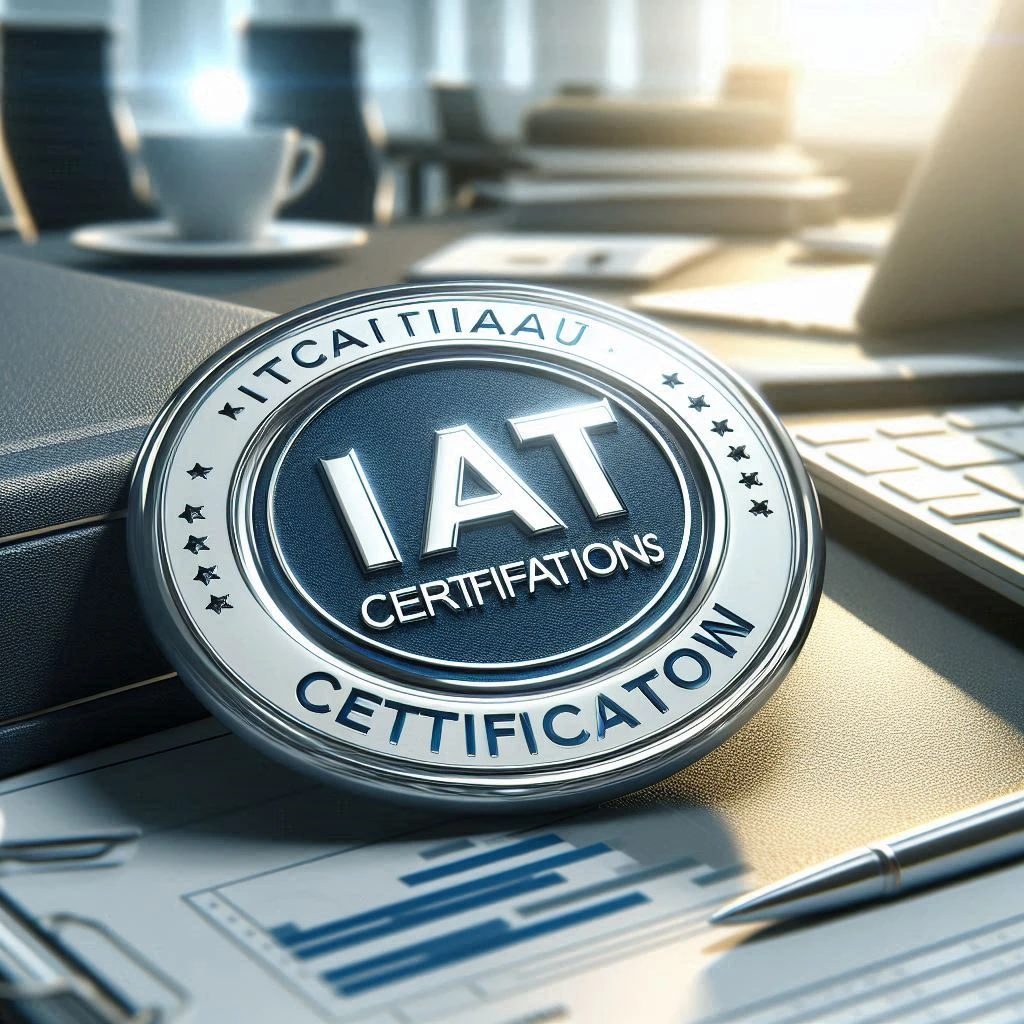In the realm of internal auditing, the Internal Audit Technician (IAT) certifications, often referred to as IAT certs, serve as a foundational stepping stone for professionals entering the field. These certifications are designed to equip aspiring internal auditors with essential skills and knowledge, ensuring they are well-prepared to navigate the complexities of internal audit practices.
Definition of IAT Certifications
IAT certifications, or Internal Audit Training certifications, represent the first level of professional designation for individuals pursuing a career in internal auditing. This certification is crucial for those new to the profession, as it establishes a common foundation of skills and knowledge related to internal audit best practices. The IAT program encompasses a structured curriculum that covers various domains of internal audit standards, culminating in a two-hour examination to validate the candidate’s understanding and competencies in the field [2].
Importance of Certifications in Internal Auditing
The significance of obtaining IAT certifications cannot be overstated. In today’s rapidly evolving business landscape, organizations face increasing risks and regulatory demands, making the role of skilled internal auditors more critical than ever. Certifications not only validate an auditor’s knowledge, skills, and experience but also enhance their credibility and trustworthiness among stakeholders. By adhering to industry standards and best practices, certified internal auditors are better equipped to perform their roles effectively and ethically, contributing to the overall success of their organizations [11][13].
Linking IAT Certifications to Best Practices in Internal Audit
This blog will delve into the specific IAT certifications and their direct relevance to internal audit best practices. By exploring how these certifications align with the core elements of the International Professional Practices Framework and the International Standards, we aim to illustrate the pathway that IAT certifications provide for internal auditors and compliance officers. Through this exploration, we will highlight how obtaining these certifications can empower professionals to implement effective audit strategies, assess risks, and enhance organizational governance [15].
IAT certifications are not just a credential; they are a vital component of a successful career in internal auditing, paving the way for professionals to master best practices and contribute meaningfully to their organizations.
Understanding Internal Audit Best Practices
Internal audit best practices are essential guidelines and methodologies that help auditors perform their duties effectively and efficiently. These practices not only enhance the quality of audits but also ensure that organizations can manage risks and achieve their objectives. Here’s an overview of what constitutes best practices in internal audit, their importance, and some widely recognized examples.
Overview of Internal Audit Best Practices
Best practices in internal audit encompass a range of principles and procedures that auditors should follow to ensure thorough and effective audits. These practices are designed to:
- Enhance Objectivity and Independence: Auditors must maintain independence from the operations they audit to provide unbiased assessments. This is crucial for the credibility of the audit process.
- Risk-Based Approach: Focusing on areas with the highest risk allows auditors to allocate resources effectively and address the most significant threats to the organization.
- Continuous Improvement: Internal auditors should regularly update their skills and knowledge to adapt to changing regulations and industry standards, ensuring that their practices remain relevant and effective.
Importance of Adhering to Best Practices for Effective Auditing
Adhering to best practices in internal audit is vital for several reasons:
- Increased Credibility: Following established best practices enhances the credibility of the internal audit function, making it a trusted advisor to management and the board.
- Improved Risk Management: By implementing best practices, organizations can better identify, assess, and mitigate risks, leading to more effective governance and compliance.
- Operational Efficiency: Best practices streamline audit processes, reducing redundancies and improving the overall efficiency of the audit function.
Examples of Widely Recognized Best Practices in Internal Audit
Several best practices have gained recognition in the field of internal audit, including:
- Adoption of Professional Standards: Internal auditors are encouraged to adopt standards set by organizations such as the Institute of Internal Auditors (IIA). These standards provide a framework for conducting audits and ensure consistency across the profession [1].
- Implementation of a Risk-Based Audit Plan: Developing an audit plan that prioritizes high-risk areas allows auditors to focus their efforts where they are most needed, thereby maximizing the impact of their work [2].
- Regular Training and Certification: Pursuing certifications such as the Certified Internal Auditor (CIA) or Internal Audit Practitioner can enhance an auditor’s skills and knowledge, ensuring they are equipped to meet the evolving demands of the profession [3][4].
- Stakeholder Engagement: Successful internal auditors actively engage with stakeholders to understand their needs and expectations, which helps tailor audit activities to provide maximum value [5].
By understanding and implementing these best practices, internal auditors and compliance officers can significantly enhance their effectiveness and contribute to the overall success of their organizations.
Overview of Key IAT Certifications
In the realm of internal auditing, obtaining relevant certifications is crucial for professionals aiming to enhance their expertise and career prospects. The following are some of the most recognized IAT certifications that align with best practices in internal audit:
1. Certified Internal Auditor (CIA)
- Description: The CIA certification is the only globally recognized internal audit certification. It signifies proficiency in internal auditing and is essential for auditors looking to deepen their knowledge and increase their influence within organizations.
- Prerequisites: Candidates must have a bachelor’s degree and at least two years of internal audit experience. Additionally, they must pass a three-part exam covering Internal Audit Fundamentals, Internal Audit Practice, and Internal Audit Knowledge Elements [12].
- Career Benefits: Earning the CIA certification can lead to increased credibility, higher salaries, and global recognition, making it a valuable asset for internal auditors [5].
2. Certified Information Systems Auditor (CISA)
- Description: Offered by the Information Systems Audit and Control Association (ISACA), the CISA certification focuses on information systems auditing, control, and security. It is particularly relevant for auditors working in IT environments.
- Prerequisites: Candidates must have at least five years of professional experience in information systems auditing, control, or security. Substitutions for experience may apply based on education and other certifications [13].
- Career Benefits: CISA certification enhances an auditor’s ability to assess and manage IT risks, which is increasingly important in today’s technology-driven business landscape. It can lead to advanced career opportunities in IT audit and security management.
3. Certified Information Security Manager (CISM)
- Description: Also offered by ISACA, the CISM certification is designed for individuals who manage, design, and oversee an enterprise’s information security program. It emphasizes the relationship between information security and business goals.
- Prerequisites: Candidates need at least five years of work experience in information security management, with a minimum of three years in at least three of the four CISM domains [13].
- Career Benefits: CISM certification is highly regarded in the field of information security and can lead to roles such as information security manager or chief information security officer, enhancing career advancement opportunities.
4. Certification in Risk Management Assurance (CRMA)
- Description: The CRMA certification, offered by The Institute of Internal Auditors (IIA), focuses on risk management and assurance. It is designed for internal auditors who want to demonstrate their knowledge of risk management practices.
- Prerequisites: Candidates must hold a CIA certification or have a bachelor’s degree along with two years of experience in risk management or internal auditing [1].
- Career Benefits: Obtaining the CRMA can enhance an auditor’s ability to provide assurance on risk management processes, making them more valuable to their organizations and improving their career prospects.
Pursuing IAT certifications such as CIA, CISA, CISM, and CRMA not only equips internal auditors and compliance officers with essential skills but also aligns their expertise with best practices in the field. These certifications can significantly enhance career opportunities, credibility, and the ability to contribute effectively to organizational success. By investing in these qualifications, professionals can position themselves as leaders in the evolving landscape of internal auditing.
Linking IAT Certifications to Internal Audit Best Practices
IAT (Internal Audit Training) certifications play a crucial role in enhancing the skills and knowledge of internal auditors and compliance officers. By aligning these certifications with specific best practices in internal audit, professionals can significantly improve their effectiveness and the overall quality of their audit processes. Below are key points illustrating this connection:
Alignment of Certifications with Best Practices
IAT Level I Certification:
- Focus: This certification emphasizes foundational knowledge in internal audit principles and practices.
- Best Practice Alignment: It aligns with the best practice of thorough audit planning and preparation, ensuring auditors are equipped to identify risks and develop effective audit strategies. This foundational knowledge is essential for creating actionable audit reports that are clear and directly linked to organizational priorities [1].
IAT Level II Certification:
- Focus: This certification builds on the foundational skills, focusing on advanced audit techniques and risk assessment.
- Best Practice Alignment: It supports the best practice of continuous improvement in audit processes. Auditors trained at this level are better prepared to implement follow-up mechanisms that review past recommendations and their current status, fostering accountability and enhancing the audit function’s value [1][2].
IAT certifications are not just credentials; they are pathways to mastering internal audit best practices. By linking specific certifications to best practices, internal auditors and compliance officers can enhance their skills, apply them effectively in real-world scenarios, and ultimately drive better audit outcomes for their organizations.
Developing a Personal Certification Strategy
In the evolving landscape of internal auditing, obtaining relevant certifications is crucial for professionals aiming to enhance their skills and align with best practices. IAT certifications serve as a valuable pathway for internal auditors and compliance officers to demonstrate their expertise and commitment to the profession. Here’s a guide on how to effectively select and pursue IAT certifications that align with your career goals.
Assessing Current Skills and Areas for Improvement
Before embarking on the certification journey, it is essential to conduct a thorough self-assessment. This involves:
- Identifying Strengths and Weaknesses: Evaluate your current competencies in areas such as risk management, governance, and internal controls. Understanding where you excel and where you need improvement will help you focus your efforts on the most relevant certifications.
- Seeking Feedback: Engage with peers or mentors to gain insights into your performance and areas that may require further development. This feedback can provide a clearer picture of your professional standing and guide your certification choices.
Setting Career Goals and Identifying Relevant Certifications
Once you have a clear understanding of your skills, the next step is to define your career aspirations. Consider the following:
- Long-term Objectives: Determine where you see yourself in the next five to ten years. Are you aiming for a leadership role within internal audit, or do you want to specialize in a particular area such as compliance or risk assessment?
- Researching Certifications: Based on your career goals, identify which IAT certifications align with your aspirations. For instance, the Certified Internal Auditor (CIA) certification is globally recognized and can significantly enhance your credibility and career prospects in internal auditing [7][8].
Creating a Timeline and Study Plan for Certification Attainment
With your goals and certifications in mind, it’s time to develop a structured approach to achieving them:
- Establish a Timeline: Set realistic deadlines for when you aim to complete each certification. Consider factors such as your current workload, personal commitments, and the time required for preparation.
- Develop a Study Plan: Create a detailed study schedule that outlines the topics you need to cover, resources you will use, and milestones to track your progress. Incorporating practical exercises and mock exams can enhance your understanding and retention of the material.
By following these steps, internal auditors can create a personalized certification strategy that not only enhances their skills but also positions them as valuable assets within their organizations. Pursuing IAT certifications is not just about obtaining credentials; it is about mastering best practices that contribute to effective internal auditing and compliance management.
Continuing Education and Lifelong Learning
In the dynamic field of internal auditing, the pursuit of knowledge does not end with obtaining certifications such as the Internal Audit Technician (IAT). Instead, continuing education plays a crucial role in ensuring that internal auditors and compliance officers remain proficient and relevant in their practices. Here are some key points highlighting the importance of ongoing education in maintaining auditing expertise:
The Role of Continuing Education in Internal Audit: Continuing education is essential for internal auditors to stay updated with the latest standards, regulations, and best practices in the industry. It helps professionals adapt to the evolving landscape of internal auditing, ensuring they can effectively address new challenges and risks that may arise in their organizations. This ongoing learning process is vital for maintaining the integrity and effectiveness of internal audit functions [6].
Opportunities for Professional Development Post-Certification: After achieving IAT certification, auditors have numerous opportunities for professional development. Engaging in advanced certifications, specialized training programs, and workshops can enhance their skills and knowledge. These opportunities not only bolster their credentials but also prepare them for more complex roles within the internal audit profession. The IAT qualification serves as a stepping stone, allowing auditors to pursue higher designations and further their careers [3][8].
Resources for Ongoing Learning: There are various resources available for internal auditors seeking to continue their education. These include:
- Courses: Many organizations offer structured training modules that cover essential topics in internal auditing, such as risk management, compliance, and audit methodologies. These courses often provide Continuing Professional Education (CPE) credits, which are necessary for maintaining certifications.
- Webinars: Online webinars are a convenient way for auditors to learn about current trends and best practices in the field. They often feature industry experts who share insights and practical advice on various auditing topics [6].
- Conferences: Attending industry conferences allows auditors to network with peers, share experiences, and learn from thought leaders. These events often include workshops and sessions focused on the latest developments in internal auditing, providing valuable knowledge that can be applied in practice.
In conclusion, the journey of mastering internal audit best practices through IAT certifications is complemented by a commitment to lifelong learning. By actively engaging in continuing education, internal auditors can enhance their expertise, adapt to changes in the profession, and ultimately contribute to the success of their organizations.
Conclusion and Next Steps
In the realm of internal auditing, IAT certifications serve as a crucial stepping stone for professionals aiming to enhance their expertise and adhere to best practices. These certifications not only validate an auditor’s knowledge and skills but also equip them with the necessary tools to navigate the complexities of the auditing landscape effectively. By obtaining IAT certifications, internal auditors and compliance officers can ensure they are well-versed in the latest methodologies and standards, ultimately leading to improved organizational performance and compliance.
As you consider your professional development, we encourage you to take the next step towards certification. Engaging in the IAT certification process can significantly bolster your career, providing you with a competitive edge in the field. Whether you are just starting your journey in internal auditing or looking to refine your skills, pursuing these certifications can open doors to new opportunities and enhance your credibility within your organization.
We invite you to share your thoughts and experiences regarding IAT certifications in the comments section below. Your insights can foster a community of learning and support among fellow internal auditors and compliance officers. Let’s collaborate to elevate our profession and ensure we are all equipped to meet the challenges of today’s auditing environment.
Find out more about Shaun Stoltz https://www.shaunstoltz.com/about/
This post was written by an AI and reviewed/edited by a human.



